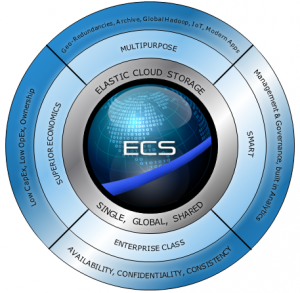The new Elastic Cloud Storage (ECS) version 2.2 enhances our 3rd generation object-based platform with cutting edge technology to simplify building and operating cloud storage. With ECS, you can take advantage of global storage for your next-gen apps as well as traditional workloads.
Enterprises and Service Providers alike are in search of a flexible solution that can deliver enterprise grade performance and capabilities at a cost that’s comparable to those offered by public clouds. ECS leverages low cost industry standard hardware combined with a smart software-defined architecture to scale almost infinitely on a single platform, simplifying IT management for a wide variety of unstructured data with cloud-scale economics; all in your own datacenter.
[youtube_sc url=”https://www.youtube.com/watch?v=BCLZ2e0mlcg”]
ECS 2.2 – What’s behind the veil:
- Multi-purpose Storage: ECS supports most industry standard object protocols (Amazon S3, OpenStack Swift, EMC Atmos & CAS) in addition to HDFS. With the new release, ECS now also supports NFS in a truly geo-scale, single namespace, and strongly consistent system. With a built-in NFS file head, ECS clients can now store file data on a globally distributed object infrastructure eliminating the need for cloud storage gateways and giving you a flexible platform with the ability to manage varied workloads.
- System Hardening and Compliance: This release provides server side or D@RE (data at rest encryption) to enterprises so they can build and leverage a public cloud equivalent storage system. ECS automates enforcement of the encryption policies to protect sensitive data without any client side changes. ECS also now fully complies with SEC 17 a-4(f) and CFTC 1.31(b)-(c) regulations which protects data from being overwritten or erased for a specified retention period.
- Metadata Search & Management: ECS enables metadata search across billions of objects without a dedicated database. You can now search user-defined meta-data via SQL construct especially suited for Internet of Things (IoT), mobile app and geo-distributed datasets. This allows the consolidation of indexing and storage into a single platform, simplifying your next-gen application development.
- Certified with Hortonworks for Hadoop: After
 extensive testing of ECS with Hortonworks HDP 2.3 we validated the integration of both platforms, thereby saving customers time to implement the solution, while providing them with an assurance of interoperability. To achieve this, EMC developed a custom Ambari stack to ease deployment of HDP on any Hadoop Compatible File System (HCFS) like ECS.
extensive testing of ECS with Hortonworks HDP 2.3 we validated the integration of both platforms, thereby saving customers time to implement the solution, while providing them with an assurance of interoperability. To achieve this, EMC developed a custom Ambari stack to ease deployment of HDP on any Hadoop Compatible File System (HCFS) like ECS.
Throughout the past year, ECS has seen tremendous momentum in the marketplace. Organizations like Verizon and the Vatican Library are already using ECS to store data for their next-gen applications at massive scale. With the storied success of both EMC Centera and Atmos and over 15 years in the object market, you can depend on ECS to help you meet the storage demands of today as well as the technological transformation of tomorrow.
Try ECS Today For Free. Try ECS today for non-production use with no capacity or time limits from www.emc.com/getecs. Developers can leverage the Developer Portal to code and test applications. Follow @ECS on Twitter for the latest and greatest content.
